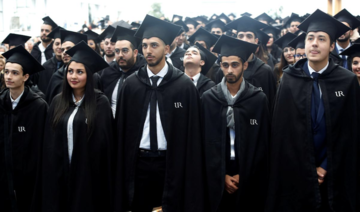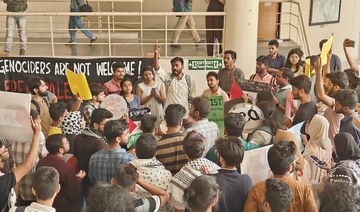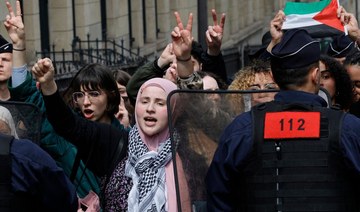WASHINGTON: The White House is threatening to veto a $4.5 billion House bill aimed at improving the treatment of migrant families detained after crossing the US southern border, saying the measure would hamstring the administration’s border security efforts and raising fresh questions about the legislation’s fate.
The warning came as Hispanic and liberal Democrats press House leaders to add provisions to the legislation strengthening protections for migrant children, changes that might make the measure even less palatable to President Donald Trump. Though revisions are possible, House leaders are still hoping for approval as early as Tuesday.
The Senate planned to vote this week on similar legislation that has bipartisan backing, but many House Democrats say the Senate version’s provisions aimed at helping migrant children are not strong enough. House Democrats seeking changes met late Monday with Speaker Nancy Pelosi, D-Calif.
“Right now, the goal is really to stop — one death is just too much,” said Rep. Adriano Espaillat, D-N.Y., as he left that meeting.
Many children detained entering the US from Mexico have been held under harsh conditions, and Customs and Border Protection Chief Operating Officer John Sanders told The Associated Press last week that children have died after being in the agency’s care. He said Border Patrol stations are holding 15,000 people — more than triple their maximum capacity of 4,000.
Congress plans to leave Washington in a few days for a weeklong July 4 recess. While lawmakers don’t want to depart without acting on the legislation for fear of being accused of not responding to humanitarian problems at the border, it seems unlikely that Congress would have time to send a House-Senate compromise to Trump by week’s end.
In a letter Monday threatening the veto, White House officials told lawmakers they objected that the House package lacked money for beds the federal Immigration and Customs Enforcement agency needs to let it detain more migrants. Officials also complained in the letter that the bill had no money to toughen border security, including funds for building Trump’s proposed border wall.
“Because this bill does not provide adequate funding to meet the current crisis, and because it contains partisan provisions designed to hamstring the Administration’s border enforcement efforts, the Administration opposes its passage,” the letter said.
Several Democrats said some language they were seeking could end up in separate legislation. Several said changes might include provisions aimed at ensuring that detained children are treated humanely.
“We’ve got lives at stake,” said Rep. Tony Cardenas, D-Calif. He said the US has been “the gold standard” for treating refugees fleeing dangerous countries, “and I don’t think we should compromise that at all.”
The meeting may have helped ease Democratic complaints. Rep. Alexandria Ocasio-Cortez, D-N.Y., told reporters before the meeting that she would oppose the bill but left the door open afterward, saying, “I oppose the situation we’re in, but my main goal is to keep kids from dying.”
Much of the legislation’s money would help care for migrants at a time when federal officials say their agencies have been overwhelmed by the influx of migrants and are running out of funds.
The back-and-forth on the spending measure came as Congress’ top Democrats criticized Trump for threatening coast-to-coast deportations of migrants.
Over the weekend, Trump tweeted that he would give Congress two weeks to solve “the Asylum and Loopholes problems” along the border with Mexico. “If not, Deportations start!” he tweeted.
The president had earlier warned that there would soon be a nationwide sweep aimed at “millions” of people living illegally in the US, including families. The sweeps were supposed to begin Sunday, but Trump said he postponed them.
Pelosi, D-Calif., said the threatened raids were “appalling” when she was asked about them at an immigration event Monday in Queens, New York.
“It is outside the circle of civilized human behavior, just kicking down doors, splitting up families and the rest of that in addition to the injustices that are happening at the border,” she said.
On the Senate floor, Minority Leader Chuck Schumer, D-N.Y., described Trump’s “chilling, nasty, obnoxious threats” and said the president “seems far more comfortable terrorizing immigrant families” than addressing immigration problems.
“I mean, my God, to threaten separating children from their parents as a bargaining chip? That’s the very definition of callousness,” Schumer said.
It is not clear exactly what Trump, who has started his 2020 re-election bid, means regarding asylum and loophole changes. He’s long been trying to restrict the numbers of people being allowed to enter the US after claiming asylum and impose other restrictions, a path he’s followed since he began his quest for president years ago. His threatened deportations came as authorities have been overwhelmed by a huge increase of migrants crossing the border into the US in recent months.
For years, Democrats and Republicans have unable to find middle ground on immigration that can pass Congress. It seems unlikely they will suddenly find a solution within two weeks.
White House threatens to veto aid bill for migrant families
White House threatens to veto aid bill for migrant families
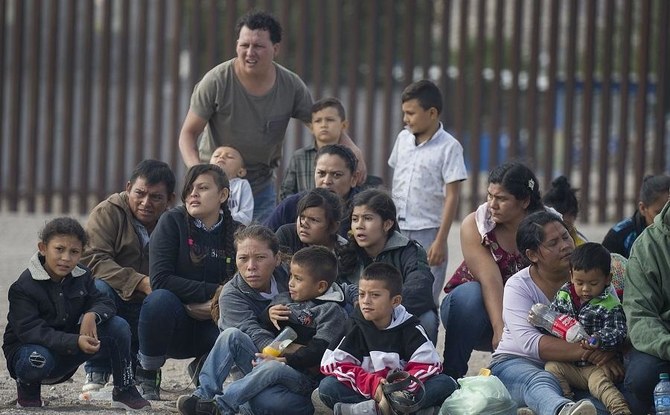
- Hispanic and liberal Democrats press House leaders to add provisions to the legislation strengthening protections for migrant children
- Many House Democrats say the Senate version’s provisions aimed at helping migrant children are not strong enough
Philippines says Chinese coast guard elevating tensions in South China Sea

Philippine officials have said a coast guard ship and a fisheries vessel were damaged when Chinese coast guard vessels fired water cannons at them while on their way to the disputed Scarborough shoal on Tuesday to help Filipino fishermen at sea.
Commodore Jay Tarriela, Philippine coast guard spokesperson on South China Sea matters, said their Chinese counterparts have elevated tensions after it directly used water cannon against one of its vessels for the first time.
“It just goes to show that Goliath is becoming more Goliath. They don’t hesitate to use brute force to violate international law,” Tarriela told a briefing.
China has previously used water cannons against Philippine navy-crewed civilian supply vessels in the region.
No country has sovereignty over Scarborough Shoal, a prime fishing patch close to major shipping lanes that is used by several countries. The shoal falls inside the Philippines’ exclusive economic zone (EEZ) and has been a constant source of flashpoint between it and China.
Tarriela added China’s actions do not count as an armed attack against a Philippine vessel, but he said China has been raising the pressure of its water cannons which have damaged their ships.
The Philippines has a longstanding mutual defense treaty with the United States and Washington has pledged its “ironclad commitment” to defending its ally against an armed attack on Filipino military and public vessels, including coast guard ships, anywhere in the South China Sea.
A spokesperson at China’s embassy in Manila said Scarborough shoal, which it calls Huangyan Dao, “has always been China’s territory” and urged the Philippines to “stop making infringement and provocations at once and not to challenge China’s resolve to defend our sovereignty.”
China claims sovereignty over much of the South China Sea, a conduit for more than $3 trillion of annual ship-borne commerce, including parts claimed by the Philippines, Vietnam, Indonesia, Malaysia and Brunei.
An international tribunal in 2016 said China’s expansive claim had no legal basis, a decision Beijing has rejected.
Police arrest Columbia students, clear occupied building in campus unrest
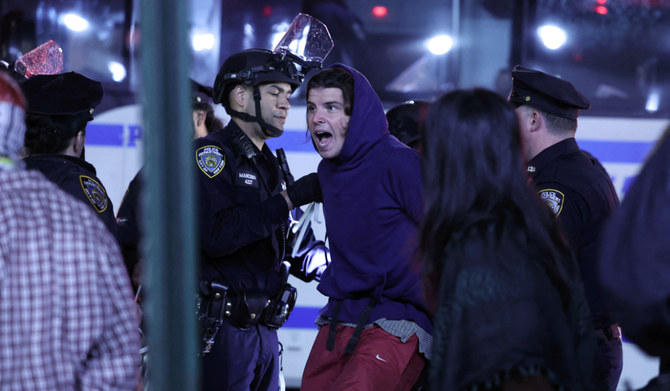
- Israel has killed more than 34,000 Palestinians, according to Gaza’s Health Ministry
- The protests have posed a challenge to university administrators trying to balance free speech rights with complaints that the rallies have veered into anti-Semitism and hate
New York, May 1, 2024 Agence France Presse: Dozens of helmeted police flooded Columbia University’s campus in the heart of New York City on Tuesday to evict a building occupied by pro-Palestinian student protesters and detain demonstrators.
Police climbed into Hamilton Hall via a second floor window they reached from a laddered truck, before leading handcuffed students out of the building into police vans.
The hall had been occupied at dawn by demonstrators who vowed they would fight any eviction, as they protested the soaring death toll from Israel’s war with Hamas in the Gaza Strip.
The action came as university administrators around the United States have struggled for weeks to contain pro-Palestinian demonstrations on dozens of campuses.
In a letter addressed to the New York Police department, Columbia University president Minouche Shafik said that the occupation of the school building was being led by “individuals who are not affiliated with the University” and asked “NYPD’s help to clear all individuals from Hamilton Hall and all campus encampments.”
She also asked the police to remain on campus through at least May 17, “to ensure encampments are not reestablished.”
Writing on Instagram, the protests slammed Shafik’s statement, saying “her use of the words ‘care’ and ‘safety’ are nothing short of horrifying.”
The weeks of demonstrations — the most sweeping and prolonged unrest to rock US college campuses since the Vietnam war protests of the 1960s and 70s — have already led to several hundred arrests of students and other activists.
Many of them have vowed to maintain their actions despite suspensions and threats of expulsion.
Earlier, protesters at Columbia were seen using ropes to hoist crates of supplies up to the building’s second floor, apparently signaling the students had planned to hunker down.
President Joe Biden’s White House had sharply criticized the seizure of Hamilton Hall, with a spokesman saying it was “absolutely the wrong approach.”
“That is not an example of peaceful protest,” the spokesman added.
The protests, with Columbia at their epicenter, have posed a challenge to university administrators trying to balance free speech rights with complaints that the rallies have veered into anti-Semitism and hate.
The unrest has swept through US higher education institutions like wildfire, with many student protesters erecting tent encampments on campuses from coast to coast.
At Columbia, demonstrators have vowed to remain until their demands are met, including that the school divest all financial holdings linked to Israel.
The university has rejected the demand. Columbia has warned that students occupying the building face expulsion.
In one of the newest clashes, at the University of North Carolina at Chapel Hill, police moved in Tuesday to clear one encampment, detaining some protesters in a tense showdown.
Meanwhile at northern California’s Cal Poly Humboldt, a week-long occupation was brought to a dramatic end early Tuesday when police moved in to arrest nearly three dozen protesters who had seized buildings and forced the closure of the campus.
In Oregon, Portland State University’s campus was closed Tuesday “due to an ongoing incident” in the library, college authorities said, after local media reported around 50 protesters had broken into the building a day earlier.
And Brown University reached an agreement in which student protesters will remove their encampment in exchange for the institution holding a vote on divesting from Israel — a major concession from an elite American university during the protests.
Footage of police in riot gear summoned at various colleges has been viewed around the world.
UN human rights chief Volker Turk voiced concern at the heavy-handed steps taken to disperse the campus protests, saying “freedom of expression and the right to peaceful assembly are fundamental to society.”
He added that “incitement to violence or hatred on grounds of identity or viewpoints — whether real or assumed — must be strongly repudiated.”
Shafik said many Jewish students had fled Columbia’s campus in fear. “Anti-Semitic language and actions are unacceptable,” she said.
The Gaza war started when Hamas militants staged an unprecedented attack on Israel on October 7 that left around 1,170 people dead, mostly civilians, according to an AFP tally of Israeli official figures.
During their attack, militants also seized hostages, 129 of whom Israel estimates remain in Gaza, including 34 whom the military says are dead.
Israel’s retaliatory offensive has killed at least 34,535 people in Gaza, mostly women and children, according to the Hamas-run territory’s health ministry.
House Republicans launch investigation into federal funding for universities amid campus protests
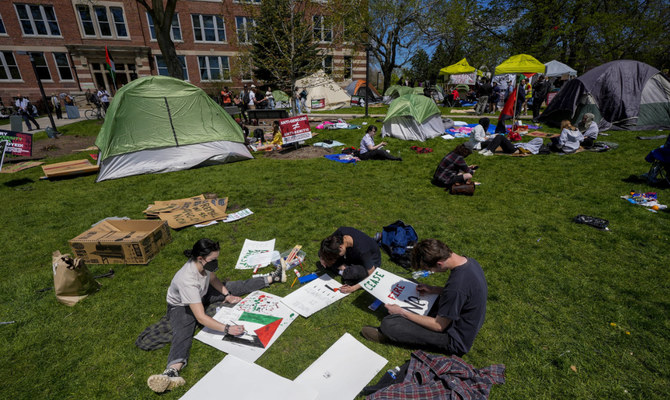
- Nationwide, campus protesters have called for their institutions to cut financial ties to Israel
WASHINGTON: House Republicans on Tuesday announced an investigation into the federal funding for universities where students have protested the Israel-Hamas war, broadening a campaign that has placed heavy scrutiny on how presidents at the nation’s most prestigious colleges have dealt with reports of antisemitism on campus.
Several House committees will be tasked with a wide probe that ultimately threatens to withhold federal research grants and other government support to the universities, placing another pressure point on campus administrators who are struggling to manage pro-Palestinian encampments, allegations of discrimination against Jewish students and questions of how they are integrating free speech and campus safety.
The House investigation follows several recent high-profile hearings that precipitated the resignations of presidents at Harvard and the University of Pennsylvania. And House Republicans promised more scrutiny, saying they were calling on the administrators of Yale, UCLA and the University of Michigan to testify next month.
“We will not allow antisemitism to thrive on campus, and we will hold these universities accountable for their failure to protect Jewish students on campus,” said House Speaker Mike Johnson at a news conference.
Nationwide, campus protesters have called for their institutions to cut financial ties to Israel and decried how thousands of civilians in Gaza have been killed by Israel following the deadly attack by Hamas on Oct. 7.
Some organizers have called for Hamas to violently seize Israeli territory and derided Zionism. Jewish students, meanwhile, have reported being targeted and say campus administrators have not done enough to protect them.
After Johnson visited Columbia last week with several other top House Republicans, he said “the anti-Jewish hatred was appalling.”
Republicans are also turning to the issue at a time when election season is fully underway and leadership needs a cause that unites them and divides Democrats. The House GOP’s impeachment inquiry into President Joe Biden has fallen flat and the Republican conference is smarting after a series of important bills left GOP lawmakers deeply divided. Democrats have feuded internally at times over the Israel-Hamas war and how campus administrators have handled the protests.
Senate Majority Leader Chuck Schumer, a New York Democrat, said in a floor speech Tuesday that it was “unacceptable when Jewish students are targeted for being Jewish, when protests exhibit verbal abuse, systemic intimidation, or glorification of the murderous and hateful Hamas or the violence of October 7th.”
Rep. Pete Aguilar, the No. 3 House Democrat, at a news conference Tuesday said that it was important for colleges “to ensure that everybody has an ability to protest and to make their voice heard but they have a responsibility to honor the safety of individuals.”
“For many of Jewish descent, they do not feel safe, and that is a real issue,” he said, but added that he wanted to allow university administrators to act before Congress stepped in.
But the Republican speaker promised to use “all the tools available” to push the universities. Johnson was joined by chairs for six committees with jurisdiction over a wide range of government programs, including National Science Foundation grants, health research grants, visas for international students and the tax code for nonprofit universities.
Without Democratic support in the divided Congress, it is not clear what legislative punishments House Republicans could actually implement. Any bills from the House would be unlikely to advance in the Democratic-controlled Senate.
But so far, the House hearings with university presidents have produced viral moments and given Republicans high-profile opportunities to denounce campuses as hotbeds of antisemitism. In December, the presidents of Ivy League universities struggled to answer pointed questions about whether “calling for the genocide of Jews” would violate each university’s code of conduct.
Rep. Elize Stefanik, the New York Republican who posed the question in the December hearing, said it became the highest-viewed congressional hearing in history. She also cast the campaign against antisemitism as part of a broader conservative push against what they say is overt liberal bias at elite American universities.
“Enough is enough,” she said. “It is time to restore law and order, academic integrity and moral decency to America’s higher education institutions.”
The House Committee on Education and the Workforce is also requesting that the administrators of Yale, UCLA and the University of Michigan appear at a hearing on May 23 that focuses on how they handled the recent protests.
“As Republican leaders, we have a clear message for mealy-mouthed, spineless leaders: Congress will not tolerate your dereliction of duty to your Jewish students,” said the committee chair, North Carolina Rep. Virginia Foxx.
At a hearing of the committee earlier this month, Columbia University’s president took a firm stance against antisemitism. But at the same time, a protest was underway on Columbia’s campus that would soon set off others like it nationwide. The university began suspending students this week in an attempt to clear the protest encampment on campus.
The university is also facing federal legal complaints. A class-action lawsuit on behalf of Jewish students alleges Columbia breached its contract by failing to maintain a safe learning environment.
Meanwhile, a legal group representing pro-Palestinian students is urging the US Department of Education’s civil rights office to investigate whether Columbia’s treatment of the protesting students violated the Civil Rights Act of 1964.
Senate Republican Leader Mitch McConnell called on university administrators to “take charge.”
“On campus, protect Jewish community members. Clear the encampments. Let students go to class and take their exams. And allow graduations to proceed,” he said.
US newspapers sue OpenAI for copyright infringement over AI training

- The newspaper cases are among several potential landmark lawsuits brought by copyright owners against tech companies over the data used to train their generative AI systems
WASHINGTON: A group of newspapers, including the New York Daily News and Chicago Tribune, sued Microsoft and OpenAI in New York federal court on Tuesday, accusing them of misusing reporters' work to train their generative artificial-intelligence systems.
The eight newspapers, owned by hedge fund Alden Global Capital's MediaNews Group, said in the lawsuit that the companies unlawfully copied millions of their articles to train AI products, including Microsoft's Copilot and OpenAI's ChatGPT.
The complaint follows similar ongoing lawsuits against Microsoft and OpenAI, which has received billions in financial backing from Microsoft, brought by the New York Times and news outlets The Intercept, Raw Story and AlterNet.
An OpenAI spokesperson said on Tuesday that the company takes "great care in our products and design process to support news organizations." A spokesperson for Microsoft declined to comment on the complaint.
The newspaper cases are among several potential landmark lawsuits brought by copyright owners against tech companies over the data used to train their generative AI systems.
A lawyer for the MediaNews publications, Steven Lieberman, told Reuters that OpenAI owed its runaway success to the works of others. The defendants know they have to pay for computers, chips, and employee salaries, but "think somehow they can get away with taking content" without permission or payment, he said.
The lawsuit said Microsoft and OpenAI's systems reproduce the newspapers' copyrighted content "verbatim" when prompted. It said ChatGPT also "hallucinates" articles attributed to the newspapers that harm their reputations, including a fake Denver Post article touting smoking as an asthma cure and a bogus Chicago Tribune recommendation for an infant lounger that was recalled after being linked to child deaths.
The plaintiffs also include the Orlando Sentinel, South Florida Sun-Sentinel, San Jose Mercury News, Orange County Register and Twin Cities Pioneer Press. They asked the court for unspecified monetary damages and an order blocking any further infringement.
UN Human Rights Chief troubled by ‘heavy-handed’ action against protesters at US colleges
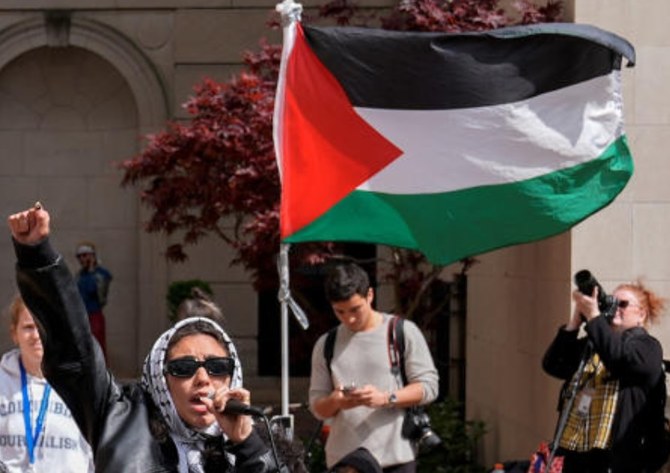
- Volker Turk says ‘freedom of expression and the right to peaceful assembly are fundamental to society, particularly when there is sharp disagreement on major issues’
- Protests have taken place on campuses in several states as students demand colleges withdraw investments from businesses involved in Israel’s assault on Gaza
NEW YORK CITY: The UN’s high commissioner for human rights on Tuesday said he is troubled by “a series of heavy-handed steps” taken by education authorities and law enforcement officials to break up protests at college campuses in the US.
Volker Turk said: “freedom of expression and the right to peaceful assembly are fundamental to society, particularly when there is sharp disagreement on major issues, as there are in relation to the conflict in the Occupied Palestinian Territory and Israel.”
Pro-Palestinian demonstrations have spread across college campuses in Texas, New York, Atlanta, Utah, Virginia, New Jersey, California and other parts of the US as students protest against the death toll during the war in Gaza, call for a ceasefire and demand authorities at their colleges withdraw investments from businesses involved in Israel’s military assault on Gaza.
Though largely peaceful, at some locations the protests have been dispersed or dismantled by security forces. Hundreds of students and teachers have been arrested, some of whom face charges or academic sanctions.
Turk expressed concern that some of the responses by law enforcement authorities at several colleges might have been disproportionate, and called for such actions to be scrutinized to ensure they do not exceed what is necessary “to protect the rights and freedoms of others.”
He added that all such actions must be guided by human rights law, while “allowing vibrant debate and protecting safe spaces for all.”
He reiterated that antisemitic, anti-Arab and anti-Palestinian activities and speech are “totally unacceptable, deeply disturbing (and) reprehensible.” However, the conduct of protesters must be assessed and addressed individually rather than through “sweeping measures that impute to all members of a protest the unacceptable viewpoints of a few,” Turk added.
“Incitement to violence or hatred on grounds of identity or viewpoints, whether real or assumed, must be strongly repudiated. We have already seen such dangerous rhetoric can quickly lead to real violence.”



